Buoyant force Study guides, Class notes & Summaries
Looking for the best study guides, study notes and summaries about Buoyant force? On this page you'll find 306 study documents about Buoyant force.
Page 3 out of 306 results
Sort by
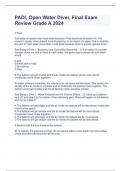
-
PADI, Open Water Diver, Final Exam Review Grade A 2024
- Exam (elaborations) • 20 pages • 2024
-
- $11.49
- + learn more
D float. Salt water is heavier than fresh water because it has dissolved minerals in it. This means it causes more upward force (buoyancy) on an object. An object that is neutrally buoyant in fresh water would float in salt water because there is greater upward force. See Being a Diver I - Buoyancy and Controlling Buoyancy. - 1) If an object is neutrally buoyant (does not sink or float) in fresh water, the same object placed into salt water would A sink. B either sink or float. C do ...
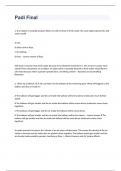
-
PADI FINAL EXAM 2024.
- Exam (elaborations) • 23 pages • 2024
- Available in package deal
-
- $11.99
- + learn more
PADI FINAL EXAM 2024. 1: If an object is neutrally buoyant (does not sink or float) in fresh water, the same object placed into salt water would A sink. B either sink or float. C do nothing. D float. - correct answer D float. Salt water is heavier than fresh water because it has dissolved minerals in it. This means it causes more upward force (buoyancy) on an object. An object that is neutrally buoyant in fresh water would float in salt water because there is greater upward force. See ...
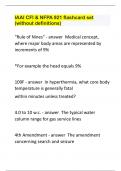
-
IAAI CFI & NFPA 921 flashcard set (without definitions)
- Exam (elaborations) • 59 pages • 2024
-
- $15.49
- + learn more
"Rule of Nines" Medical concept, where major body areas are represented by increments of 9% *For example the head equals 9% 109F In hyperthermia, what core body temperature is generally fatal within minutes unless treated? 4.0 to 10 w.c. The typical water column range for gas service lines 4th Amendment The amendment concerning search and seizure *Remember "knocking" 5th Amendment The amendment concerning pleading, grand jury and double jeopardy *Re...
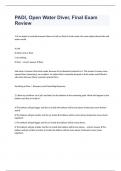
-
PADI, Open Water Diver, Final Exam Review 2023 updated to pass
- Exam (elaborations) • 27 pages • 2023
-
- $19.99
- + learn more
PADI, Open Water Diver, Final Exam Review1) If an object is neutrally buoyant (does not sink or float) in fresh water, the same object placed into salt water would A sink. B either sink or float. C do nothing. D float. - correct answer D float. Salt water is heavier than fresh water because it has dissolved minerals in it. This means it causes more upward force (buoyancy) on an object. An object that is neutrally buoyant in fresh water would float in salt water because there is greater ...
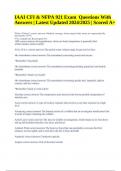
-
IAAI CFI & NFPA 921 Exam Questions With Answers Latest Updated 2024/2025 | Graded A+.
- Exam (elaborations) • 17 pages • 2024
- Available in package deal
-
- $13.99
- + learn more
IAAI CFI & NFPA 921 Exam Questions With Answers Latest Updated 2024/2025 | Graded A+. "Rule of Nines" correct answers Medical concept, where major body areas are represented by increments of 9% *For example the head equals 9% 109F correct answers In hyperthermia, what core body temperature is generally fatal within minutes unless treated? 4.0 to 10 w.c. correct answers The typical water column range for gas service lines 4th Amendment correct answers The amendment concerning search and s...

-
PADI, Open Water Diver, Final Exam Questions & Answers 2024.
- Exam (elaborations) • 27 pages • 2024
- Available in package deal
-
- $11.99
- + learn more
PADI, Open Water Diver, Final Exam Questions & Answers 2024. D float. Salt water is heavier than fresh water because it has dissolved minerals in it. This means it causes more upward force (buoyancy) on an object. An object that is neutrally buoyant in fresh water would float in salt water because there is greater upward force. See Being a Diver I - Buoyancy and Controlling Buoyancy. - correct answer 1) If an object is neutrally buoyant (does not sink or float) in fresh water, the same o...
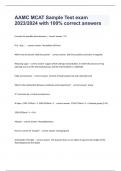
-
AAMC MCAT Sample Test exam 2023/2024 with 100% correct answers
- Exam (elaborations) • 7 pages • 2023
-
- $16.49
- + learn more
Formula for possible stereoisomers - correct answer 2^n If Q > Ksp.... - correct answer Precipitate will form Which way do electric field lines point? - correct answer Exit from positive and enter at negative Reducing sugar - correct answer Sugars which undergo mutorotation, in which the process of ring opening occrus at the hemiacetal group, and the intermediate is a aldehyde Fatty acid structure - correct answer Consists of hydrocarbon tail and carboxylic acid What ...
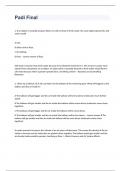
-
Padi Final questions with verified solution 2023 passed
- Exam (elaborations) • 23 pages • 2023
- Available in package deal
-
- $19.99
- + learn more
Padi Final 1: If an object is neutrally buoyant (does not sink or float) in fresh water, the same object placed into salt water would A sink. B either sink or float. C do nothing. D float. - correct answer D float. Salt water is heavier than fresh water because it has dissolved minerals in it. This means it causes more upward force (buoyancy) on an object. An object that is neutrally buoyant in fresh water would float in salt water because there is greater upward force. See Being a Div...
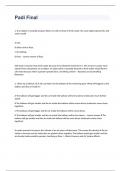
-
Padi Final1 questions with correct answers 2023 passed
- Exam (elaborations) • 23 pages • 2023
- Available in package deal
-
- $19.99
- + learn more
Padi Final11: If an object is neutrally buoyant (does not sink or float) in fresh water, the same object placed into salt water would A sink. B either sink or float. C do nothing. D float. - correct answer D float. Salt water is heavier than fresh water because it has dissolved minerals in it. This means it causes more upward force (buoyancy) on an object. An object that is neutrally buoyant in fresh water would float in salt water because there is greater upward force. See Being a Dive...
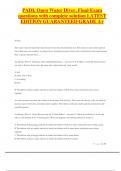
-
PADI, Open Water Diver, Final Exam questions with complete solution LATEST EDITION GUARANTEED GRADE A+
- Exam (elaborations) • 25 pages • 2024
- Available in package deal
-
- $11.49
- + learn more
D float. Salt water is heavier than fresh water because it has dissolved minerals in it. This means it causes more upward force (buoyancy) on an object. An object that is neutrally buoyant in fresh water would float in salt water because there is greater upward force. ,,, See Being a Diver I - Buoyancy and Controlling Buoyancy. - answers>1) If an object is neutrally buoyant (does not sink or float) in fresh water, the same object placed into salt water would A sink. B either sink or...

That summary you just bought made someone very happy. Also get paid weekly? Sell your study resources on Stuvia! Discover all about earning on Stuvia


